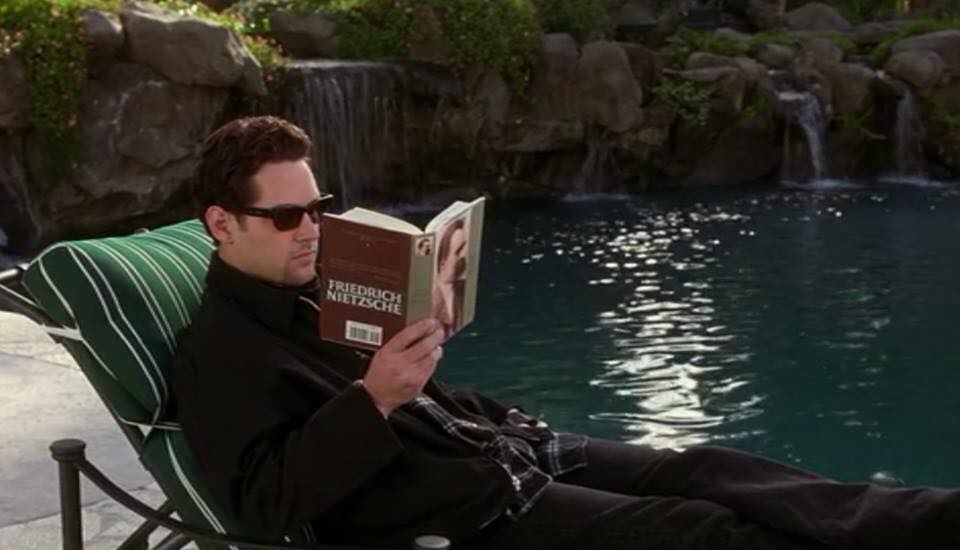
Email all work to me at [email protected].
Chomsky on the Watergate scandal and COINTELPRO
"Bring me the Steak Au Poivre"
"There is, in the first place, the difficulty of expression. We all indulge in the strange, pleasant process called thinking, but when it comes to saying, even to someone opposite, what we think, then how little are we able to convey! The phantom is through the mind and out of the window before we can lay salt on its tail, or is slowly sinking and returning to the profound darkness which it has lit up momentarily with a wandering light. . . . It is for this reason that Montaigne stands out from the legions of the dead with such irrepressible vivacity. We can never doubt for an instant that his book was himself."
--Virginia Woolf
Invasion Of The Body Snatchers (1956) - Trailer
"I'm Not Crazy!" Mental Illness on Film (2017)
"The Sceptics, the only honourable type of respect among the ever-so multiply ambiguous tribe of the philosophers!"
--Nietzsche, Ecce Homo: How One Becomes What One Is
The one thing which we seek with insatiable desire is to forget ourselves, to be surprised out of our propriety, to lose our sempiternal memory and to do something without knowing how or why; in short to draw a new circle. Nothing great was ever achieved without enthusiasm. The way of life is wonderful; it is by abandonment. The great moments of history are the facilities of performance through the strength of ideas, as the works of genius and religion. "A man," said Oliver Cromwell, "never rises so high as when he knows not whither he is going." Dreams and drunkenness, the use of opium and alcohol are the semblance and counterfeit of this oracular genius, and hence their dangerous attraction for men. For the like reason they ask the aid of wild passions, as in gaming and war, to ape in some manner these flames and generosities of the heart.
--Ralph Waldo Emerson, Essays, First Series
To get quickly acquainted with Montaigne, Emerson, and Nietzsche, I suggest you read the linked Wikipedia entries for each writer. You may find much fuller entries at Stanford Philosophy online: Montaigne, Emerson, transcendentalism, and Nietzsche And you should also consult the relevant pages on Stoicism, Skepticism, Moral Skepticism, Epictetus, Epicurus, Sextus Empiricus, Lucretius, Pyrrho, and Seneca. Ditto for David Hume and Arthur Schopenhauer. Stanley Cavell has written very thoughtful work on Skepticism and an excellent book on Emerson (we will read a chapter from it).
News on the March (formerly known as "Outburts")
Poor Richard’s Almanac:
BURT’S Prognostications, Prophecies, and Predictions
Ten minutes of birdsong from the English countryside
TENTATIVE SCHEDULE (Please expect minor adjustments to be made in the schedule from time to time; all changes will be announced both in class and on the class email listserv; this webpage will also be updated.)

YOUR FIRST ASSIGNEMENT Due Tuesday, January 8 by 5:00 p.m.: One discussion question on How to Live: Or A Life of Montaigne in One Question and Twenty Attempts at an Answer, and three BIG WORDS, numbered one, two, and three, on each reading. Put your name at the top left of the document. Email all work to me at [email protected] . With One Exception, Discussion Questions are due the day before class on Sundays and Tuesdays by 5:00 p.m.
January 7: Cheerful, Chilly, and Cranky / Free Spirits and Free Thinkers
We will read three some of the major works of cheerful thinkers in relation to some of these broad questions: Do You Have an Opinion? What Does It Mean to Think for Yourself? The Primacy of Doxa Over Episteme / Moral Philosophy (Socrates, "What Is The Good?"; "What Is Truth?") vs Political Philosophy (Hobbes and Locke, "What is good for me?") / Censorship (Hume) / Dialectic and Rhetoric: Aristotle, Schopenhauer, pp. 102-03; 94-97; 40-41;112-15;173; 399-40; 338-41; 282-88; 423-432; 350-51; 335-44) / Liars for Hire (Sophists) versus Physicians of the Soul (Socrates) / (Anti-) / (Neoliberal / STEM) Education versus Ignorance (What is a good education?) / Memory versus Forgetting / Opinion versus Taste / Aesthetic Judgment and Critical Judgment (Kant) / How to Live? How to Die? / Persuasion and Coercion / Thinking for Yourself vs. Groupthink /Questioning and Answering (Responding) / Freedom of Thought / Freedom of Expression / Public and Publicity / Posterity System / Opinion System / Secular and Theological Close Reading
Skeptical Thoughts on Skepticism: Did You Read It? How Well Do You Know What You've Read? How Much Do You Remember? Is rote memorization the same thing as knowing what You've memorized? How many times did you read it? Over how long a period of time? the Importance of Other Readers to Your Reading (Reading is solitary and social.)
Bach, Cello Suite 5 Yo-Yo Ma "Courante"
Whereby may be seen that nothing is so hard or so uncertaine to be found out as the certaintie of the truth, sithence no man can put any assured confidence concerning the truth of a battel, neither in the knowledge of him that was Generall or commanded over it, nor in the soldiers that fought, of anything that hath hapned amongst them; except after the manner of a strict point of law, the severall witnesses are brought and examined face to face, and that all matters be nicely and thorowly sifted by the objects and trials of the successe of every accident. Verily the knowledge we have of our owne affaires is much more barren and feeble. But this hath sufficiently been handled by Bodin, and agreeing with my conception. Somewhat to aid the weaknesse of my memorie and to assist her great defects; for it hath often been my chance to light upon bookes which I supposed to be new and never to have read, which I had not understanding diligently read and run over many years before, and all bescribled with my notes; I have a while since accustomed my selfe to note at the end of my booke (I meane such as I purpose to read but once) the time I made an end to read it, and to set downe what censure or judgement I gave of it; that so it may at least at another time represent unto my mind the aire and generall idea I had conceived of the Author in reading him. I will here set downe the Copie of some of my annotations, and especially what I noted upon my Guicciardine about ten years since: (For what language soever my books speake unto me I speake unto them in mine owne.) He is a diligent Historiographer and from whom in my conceit a man may as exactly learne the truth of such affaires as passed in his time, as of any other writer whatsoever: and the rather because himselfe hath been an Actor of most part of them and in verie honourable place.
--Michel de Montaigne, "Of Bookes"
January 9
Required Reading:
1. Sarah Bakewell, How to Live: Or A Life of Montaigne in One Question and Twenty Attempts at an Answer, "Chapter 4: Q: How to live? Read a lot, forget most of what you read, and be slow-witted," pp. 64-89.

Recommended (Not Required) Readings and Viewings:
Thedorno Adorno, "The Essay as Form," New German Critique, No. 32 (Spring - Summer, 1984), pp. 151-171
"Michel de Montaigne, the inventor of the modern personal essay and the writer to whom modern essayists endlessly return, is renowned for his tendency to go off topic. His chapter “Des coches” (“Of Vehicles” or “Of Coaches”), for example, begins with remarks about authors, goes on to sneezing and fear, then touches quite briefly on the subject of coaches before proceeding to kings, gifts, amphitheaters, the impossibility of knowledge, and the civilizations of the New World. It ends with a story about the king of Peru, whose soldiers carry him into battle against the Spanish invaders on a chair of gold mounted on golden shafts. His men are killed, one by one, but each time a bearer falls, another leaps to replace him, keeping the king aloft on his perilously wobbling seat, until at last he is dragged down and taken prisoner. A gold litter—we belatedly realize—could be classified as a vehicle, so Montaigne has come back to his subject after all. But by this time we are so disoriented, and have traveled such a long distance, that we are as off-balance as the king and scarcely know where we are."
--Sarah Bakewell, "Reverie and Ambush: On the Influence of Montaigne"
First English Edition of Michel de Montaigne’s Essays (1603)
January 10 (Nothing Due, it's Thursday)
January 11 (Nothing Required, it's Friday)
At Berkeley (dir. Frederick Wiseman, 2013)
NOTE BENE: Your First Paper (500 words, not including quotations) will be DUE Saturday February 2 by 11:59 p.m. You may write your paper on any text we have read. I encourage you to make up your own paper topic. If you need any help, just email or talk to me in class and we can schedule a time to talk.
Due Sunday, January 13 by 5:00 p.m.: Two discussion questions on Michel de Montaigne, "Of Bookes" and three BIG WORDS, numbered one, two, and three. Put your name at the top left of the document. Email all work to me at [email protected] With One Exception, Discussion Questions are due the day before class on Sundays and Tuesdays by 5:00 p.m.
January 14 Remembering What You've Read, or Not
Required Reading:
--Michel de Montaigne, "Of Bookes," Book 2, Chapter 10, 359-71 in Donald Frame (pp. 457-71, in M. A. Screech)


Recommended Reading:
Richard L. Regosin, "Montaigne's Dutiful Daughter," in Montaigne's Unruly Brood: Textual Engendering and the Challenge to Paternal Authority
Keffer, K., A Publication History of the Rival Transcripts of Montaigne's Essays (2001)
Due Tuesday, January 15 by 5:00 p.m.: Two discussion questions on Pierre Bayard, "Chapter IV: Books You Have Forgotten" and three BIG WORDS, numbered one, two, and three. Put your name at the top left of the document. Email all work to me at [email protected] Discussion Questions are due the day before class on Sundays and Tuesdays by 5:00 p.m. With One exception, nothing is due Thursdays for class on Fridays.
January 16 Pile Up: The Problem of Medium and Memory, or Storage and Retrieval (Analog versus Digital?)
Required Reading:
Pierre Bayard, "Chapter IV: Books You Have Forgotten," in How to Talk About Books You Haven't Read" 2007, 32-46
Recommended Thinking: If we can't remember what we've read, have we even read what we read, I mean, have we necessarily or ever read what the author wrote? I don't mean that the author had laspes of memory when writing the book. I mean has the publisher / editor produced a reliable edition? What would "reliable" mean? What happens when there is more than one edition of the same book? Should one read the versions comparatively? Take Montaigne's three editions and posthumously published "Bordeaux Manuscript" as independent versions even if each edition was published under the same title? Should one read Montaigne with or without an editorial apparatus that uses letters to distinguish material added to each edition? Sarah Baker says that had Montaigne's writing became increasingly incomphrensible to his friends and that lived longer, he would have eventually made his work unreadable. She compares the Essays to Laurence Sterne's Tristram Shandy. Does Skepticism ever stop? Or does it just keep going until we cannot be sure we have read a text or that the text itself is what the author wrote? Is there any limit to what Montaigne calls the uncertainty of truth?
O'Brien, J. "Are We Reading What Montaigne Wrote?" French Studies, 58 (2004), 527-532.
Maurice Merleau-Ponty, “Reading Montaigne,” in Signs, trans. and ed. Richard C. McCleary (Evanston, IL: Northwestern University Press, 1964), 198–210.
Can we still read Montaigne?
Gérard Defaux and John A. Gallucci, "Readings of Montaigne," Yale French Studies No. 64, Montaigne: Essays in Reading (1983), pp. 73-92
January 17: Nothing is Due (It's Thursday)
January 18: Nothing is Due (It's Friday)
Giving Up the Ghost: Michel de Montaigne, "Letter to His Father: On the Death of Étienne de la Boétie," and "That to Philosophize Is Learning How to Die"
The Book People of Fahrenheit 451
The HBO remake suggests without having the courage of its convictions, that reading really does disturb you. Deeply. Ditto for being a writer (Kafka and Dosteyevsky are the examples of burnable literature the remake holds up). Michael Shannon's character, a writer who burns his own aphoristic writings, should have convinced his sudorinate Montagg that burning books was the best thing to do after all since reading leads to mental illness. Instead, we get a preposterous happy ending with flocks of either CGI sparrows or CGI starlings moving in rings that look like the shape of DNA.
Fahrenheit 911 (dir. Michael Moore, 2018)
GEERT LOVINK ON “SAD BY DESIGN”
A Journey Round my Room (1794 / 1871)

Les "Essais" de Montaigne. Un exemplaire exceptionnel sur Gallica
You can buy your own copy of the color reproduction of the Bordeaux Copy of Montaigne's Essais, published in July 2002!
And you can also buy a copy of Les Essais. Edition nouvelle prise sur l exemplaire trouvé après le deceds de l autheur, reveu augmenté d un tiers oultre les précédentes impressions. Enrichi de deux tables curieusement exactes et élabourées!

De la sagesse : trois livres. T. 1 / par Pierre Charron
Charron, Pierre, 1541-1603 De la sagesse; trois livre
Essais de Michel seigneur de Montaigne. Cinquiesme edition
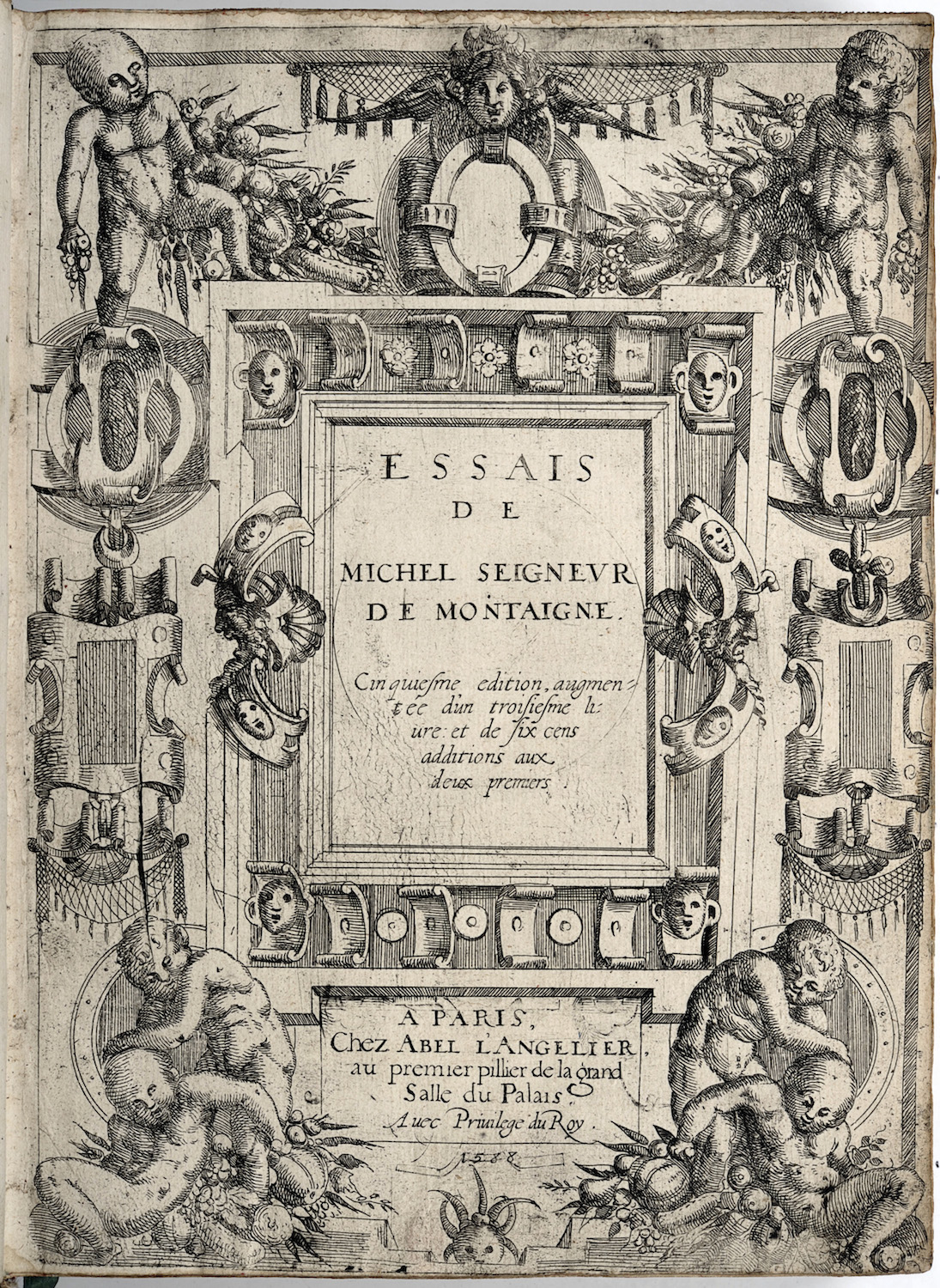


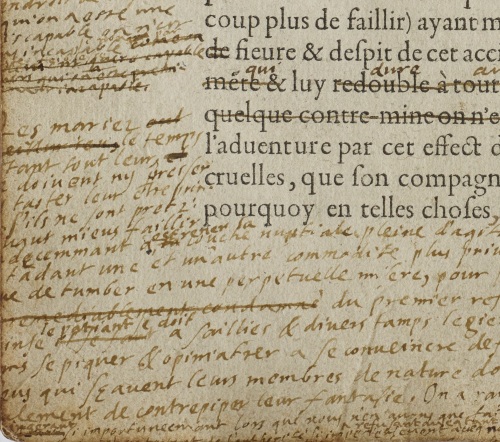
Gore Vidal’s review of The Complete Essays, edited by M. A. Screech, appeared in the TLS of June 26 1992.
January 21 Martin Luther King Jr. Day! Please do not fall for the bogus right-wing "we are nto a racist country" white-washing of MLK Jr. He was always a radical, and he courageously gave this speech against the Viet Nam War shortly before he was assassinated. I was 13 years old at the time. I did not hear this speech until decades later. We have not come very far since then, imo. Even many ways we gone backwards. "Martin Luther King Jr. courageously spoke out about the Vietnam War. We must do the same when it comes to this grave injustice of our time."
Because Monday, January 21 is a Holiday, DQs will not be due Sunda,y January 20. They will be due, however on Tuesday January 23 and Thursday, January 24. (This is the one exception.)
Due on Tuesday January 22 by 5:00 p.m. DQs and BIG WORDS on Montaigne's "Of Practice," Book 2, Chapter 6, 324-33; DF trans; 416-27 (MAS)
Wednesday, January 23 Montaigne's Pyrronism
"'When I play with my cat, how do I know that she is not playing with me rather than I with her?"
1. Required Reading:
Montaigne, "Of Practice," Book 2, Chapter 6, 324-33 (DF); 416-27 (MAS)
2. Required Viewing, but no DQs (it's very short):
Sarah Bakewell introduces How to Live: A Life of Montaigne


Due Thursday, January 24 by 5:00 p.m.: Two discussion questions on Montaigne's "Of Repentance", as well as three BIG WORDS, numbered one, two, and three from both readings. Put your name at the top left of the document. Email all work to me at [email protected]
Friday January 25 Skepticism, Stoicism
Montaigne, "Of Repentance," Book 3, Chapter 2, pp. 740-752 (DF); 907-21 (MAS)
Recommended Reading:
Montaigne bi-lingual, "Of Repentance"
Michel Eyquem de MONTAIGNE (1533-1592)
"DU REPENTIR" with words glossed in modern French.
"Moy le primiere" and other "firsts"
How among the frozen words Pantagruel found some odd ones.
Lucius Annaeus Seneca. Moral Epistles. Translated by Richard M. Gummere. The Loeb Classical Library. Cambridge, Mass.: Harvard UP, 1917-25. 3 vols.: Volume I. (Montaigne quoted Seneca more often than he did anywone else. He quoted from the letters most often.)
Due Sunday, January 27 by 5:00 p.m.: English Translations of French quotations in Erich Auerbach's "L'Humaine condition." Email all work to me at [email protected]
This is an example of what you will turn in.
This is how you get there. And this is more help getting you there.
Monday January 28
Erich Auerbach, "L'Humaine condition," in Mimesis: The Representation of Reality in Western Literature - New and Expanded Edition, Trans, Willard R. Trask, ed. Edward W. Said, pp. 285-311.
Recommended Reading:
Francois Rabelais, Gargantua and Pantagruel, Complete Translated into English by Sir Thomas Urquhart of Cromarty and Peter Antony Motteux. Rabelais' "Prologue" and "Conclusion" to Book II and Montaigne's "Au Lecteur," or "To the Reader" (Rabelais in French http://www.fcsh.unl.pt/docentes/rmonteiro/Pdf/1532 Gargantua_et_Pantagruel1_Rabelais_francês.pdf And Garganuta in French here.
Lives, the Dryden Plutarch. Rev. by Arthur Hugh Clough
(Plutarch was one of Montaigne's major inspirations.)
HEADS UP: First Paper (500 words, not including quotations) DUE Saturday February 16 by 11:59 p.m. Read an essay by Montaigne of your choosing and read it the way Auerbach reads "Of Repentance" in his chapter "L'Humaine condition," Pick an essay of your choosing and take a passage from it you take to be central to it.
Due Tuesday, January 29 by 5:00 p.m.: Two discussion questions on Ralph Waldo Emerson "Montaigne, or the Skeptic" as well as three BIG WORDS, numbered one, two, and three. Put your name at the top left of the document. Email all work to me at [email protected]
Conisder these two portraits of Montaigne, young and old. In the young one, he looks directly at the viewer. In the older one, his eyes are turned to his far right. If you want to see me, you will have to look outside the frame, he seems to suggest, truth being seen obliquely and even then invisible and ?inaccessible.


Wednesday January 30 Skepticism, Stoicism
Ralph Waldo Emerson "Montaigne, or the Skeptic," 326-47.
This is the 1685-86 Cotton translation of the Essays Emerson read and that he mentions in his essay.
You might want to come back to the Cotton translation later in the semester if you find you have time to compare it to Frame's and Screech's translation. The preface is worth reading. We will be reading this edition:

Friday February 1
I will be away in Los Angeles for my mother's funeral this day. But come to class anyway. You can randomly go to passages in "To Philosophize Is to Learn to Die," both Frame's translations (one facing page) and Florio's, and discuss how they differ. It's actually a cheerful essay. And send me a selfie with the class in it. I would really like that.
http://users.clas.ufl.edu/burt/SkepticismMontaigneEmersonNietzsche/Montaingeautobiography.pdf
The Loser Moment: From time to time, I will take a moment to read you a passage from a work I like or play music for you and talk about it or show you a painting and talk about it. You can play with the lighting. I will have a flashlight so I can read in the dark. Students are welcome to take your own loser moments. If you like the moment, please do a slow clap. But be sure not to join in the clapping. Since it will have been a loser moment, a failed slow clap is the best response.

DQs due Sundays and Tuesdays by 5:00 p.m. for the rest of the semester.
February 4
I will be away in Los Angeles for my mother's funeral this day. But come to class anyway. You can randomly go to passages in "To Philosophize Is to Learn to Die," both Frame's translations (one shorter, with facing pages in English and French) and Florio's, and discuss how they differ. And send me a selfie with the class in it again. :)
"It is the inattentive reader who loses my subject, not I. Some word about it will always be found off in a corner, which will not fail to be sufficient, though it takes little room. I seek out change indiscriminately and tumultuously. My style and my mine alike go roaming. A man must be a little mad if he does not want to be even more stupid, say the precepts of our masters, and even more so their examples."
February 6
Required Reading:
Michel de Montaigne, "Of Vanity," Book 3, Chapter 9, pp. 876-932 (DF)


February 8
Required Reading (but no DQs):
Michel de Montaigne, "Of Vanity," Book 3, Chapter 9, pp. 876-932 (DF)


Recommended Reading:
Blaise Pascal, "Vanity," in Pensees, Oxford World's Classics, pp. 12-22.
Michel de Montaigne, "An Apology for Raymond Sebond," pp. 386-554.
"Of the Consistency of Our Actions," pp. 290-96.
February 11 Emerson Before and After the Death of His Son Waldo
Required Reading:
Ralph Waldo Emerson, "Circles," pp. 186-99.

February 13
Required Reading:
Ralph Waldo Emerson, "The Harvard Divinity School Address," pp. 100-19.

February 15: The Opinion System
DUE Saturday February 16: First Paper (500 words, not including quotations) by 11:59 p.m. Read an essay by Montaigne of your choosing and read it the way Auerbach reads "Of Repentance" in his chapter "L'Humaine condition," Pick an essay of your choosing and take a passage from it you take to be central to it. Then read that passage closely. For more, see below at the end of the schedule.
Recommended Reading:
Kurt Wetters, "Lichtenberg's Opinions-System"
Theodor W. Adorno,"Opinion Research and Publicness (Meinungsforschung und Offentlichkeit)
Theodor W. Adorno, "Opinion Delusion Society"
Thomas Hobbes: A grim portrait of human nature
NY Times Writer Criticizes Tulsi Gabbard| Joe Rogan
February 18: Montaigne and His Covenant Daughter, Marie de Gournay
Required Reading:
Montaigne, "Of Experience," pp. 992-1048


February 20
Montaigne, "Of Experience," pp. 992-1048


February 22
Recommended Reading:
Walter Benjamin on habit and attention, Montaigne on "Diversion," Blaise Pascal on "Divertissement," and Paul North on The Problem of Distraction


February 25
Required Reading:
Ralph Waldo Emerson, "Experience"

February 27
Required Reading:
Ralph Waldo Emerson, "Experience"

Ralph Waldo Emerson, "Experience" (No DQs)

Recommended Reading:
On neoliberal education:
"The company eagerly cultivates an academic aura, and the facility is
referred to as its “campus.” The campus bookstore sells dozens of
business books, of the kind ubiquitous in airport newsstands. Typical
selections included The World’s Most Powerful Leadership Principle:
How to Become a Servant Leader (featuring a jacket blurb from the
Senior Vice President of Operations for Chik-fil-a) and Leading with
Soul: An Uncommon Journey of Spirit. Alas, they did not have my
favorite managerial tome of all time, If Harry Potter Ran General
Electric: Leadership Wisdom from the World Of Wizards, which is a
genuine, honest-to-God book that you can look up and purchase."
https://www.currentaffairs.org/2016/06/the-unendurable-horrors-of-leadership-camp
If you need to relax . . . . (go directly to time stamp 1:54)
Neoliberalese at the corporate university: "Raising Awareness"
March 4-8 Spring Break


March 11
Required Reading:
Ralph Waldo Emerson, "Nature," 27-70

March 13
Ralph Waldo Emerson, "Nature," 27-70

March 15
Required Reading: (No DQs are due.)
Ralph Waldo Emerson, "Fate," pp. 400-28.
Read at least to page 410, and read it all, if you can. We will return to this important essay on April 12.
March 18
Required Reading:
FRIEDRICH Nietzsche, Twilight of the Idols, from the Preface through Skirmishes of an Untimely War, no. 44 (13 is on Emerson.) pp. 155-218
The Big Lebowski - Nihilists /
The Big Lebowski - Bathtub / Nihilists scene
March 20
Required Reading:
FRIEDRICH NIETZSCHE, Beyond Good and Evil: Prelude to a Philosophy of the Future, Preface and Parts One-Four, with particular attention to Part Two, "The Free Spirits."
in The Complete Works of Friedrich Nietzsche, Vol. 8 (Beyond Good and Evil / On the Genealogy of Morality)
Adrian Del Caro (Translator)
The Project Gutenberg EBook of Jenseits von Gut und Bose by Friedrick Wilhelm Nietzsche

March 22
Required Reading:
FRIEDRICH NIETZSCHE, Beyond Good and Evil, pp. Parts Five-Seven
in The Complete Works of Friedrich Nietzsche, Vol. 8 (Beyond Good and Evil / On the Genealogy of Morality)
Adrian Del Caro (Translator)

March 25
"Reading Nietzsche as a Loser"
Required Reading:
FRIEDRICH NIETZSCHE, Beyond Good and Evil, pp. Part Eight-From Lofty Mountains: Aftersong
Adrian Del Caro (Translator)

March 27
Required Reading:
FRIEDRICH NIETZSCHE, On the Genealogy of Morality, First Treatise TRANSLATED, WITH AN AFTERWORD, BY ADRIAN DEL CARO

Recommended Reading:
Malcolm Bull, "Anti-Nietzsche," in Anti-Nietzsche (2014), pp. 27-54
Malcolm Bull, "Where is the Anti-Nietzsche?" in NLR 3, May-June 2000, pp. 121-145
March 29
Required Reading:
FRIEDRICH NIETZSCHE, On the Genealogy of Morality, First Treatise
Adrian Del Caro (Translator)
Recommended Reading:
Avital Ronell, "The Test Drive," inThe Test Drive

Recommended Reading:
Jacques Derrida, Death Penalty Seminar, Vol. 1, Sixth Session, 138-64
April 1
Required Reading:
FRIEDRICH NIETZSCHE, On the Genealogy of Morality, Second Treatise
Adrian Del Caro (Translator)

April 3
Required Reading: (No DQs)
FRIEDRICH NIETZSCHE, On the Genealogy of Morality, Third Treatise
Adrian Del Caro (Translator)

April 5
Required Reading (No DQs due):
Friedrich Nietzsche, "Lecture II, Lecture V, and Introduction," in Anti-Education: On the Future of Our Educational Institutions , pp. 20-36; 70-86; 89-95.
Excerpted here:
From the September 2015 issue of Harper's Magazine
"The Genealogy of Orals"
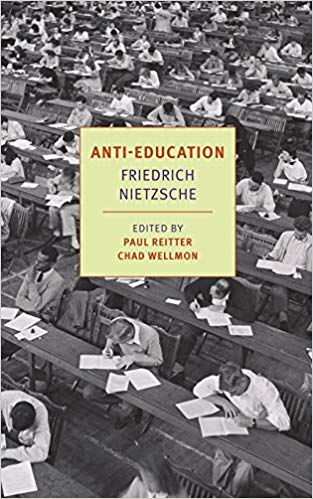
April 8:
Required Reading :
Michel de Montaigne, "Of Cannibals"


April 10: Billiards
Required Reading:
David Hume, An Enquiry Concerning Human Understanding, Section XII Of the Academical or Skeptical Philosophy, 18-29.
Recommended Reading:
David Hume, An Enquiry Concerning Human Understanding, Section XII Of the Academical or Skeptical Philosophy, liii-lvi; 109-120.

April 12
Required Reading:
Ralph Waldo Emerson, "Fate," pp. 400-28. Finish reading it, if you didn't already. Reread it if you did. :)

April 15 to 22 I will be in Chongping and Hang Zhou giving four invited lectures on Shakespeare.
April 15
Ralph Waldo Emerson, "The American Scholar," 72-92.

Required Reading:
April 17
Required Reading:
Ralph Waldo Emerson, "The American Scholar," 72-92.

April 19
Required Reading:
Ralph Waldo Emerson, "Self-Reliance," 160-85

Second Paper (500 words, not including quotations) DUE Saturday, April 21 by 11:59 p.m. You may write your paper on any text we have so far. I encourage you to make up your own paper topic. If you need any help, just email or talk to me in class and we can schedule a time to talk.
April 15 to 22 I will be in Chongping and Hang Zhou China giving four invited lectures on Shakespeare. I will have someone come to class and teach in my place along with the co-leaders.
April 22
Required Reading (No DQs due):
Ralph Waldo Emerson, "Self-Reliance," 160-85

April 24
Required Reading:
Jacques Derrida on Blaise Pascal's posthumously discovered note sewn into his vest shortly before he died:
The Beast and the Sovereign, Vol. 2, pp. 208-14
FINAL EXERCISE in class.
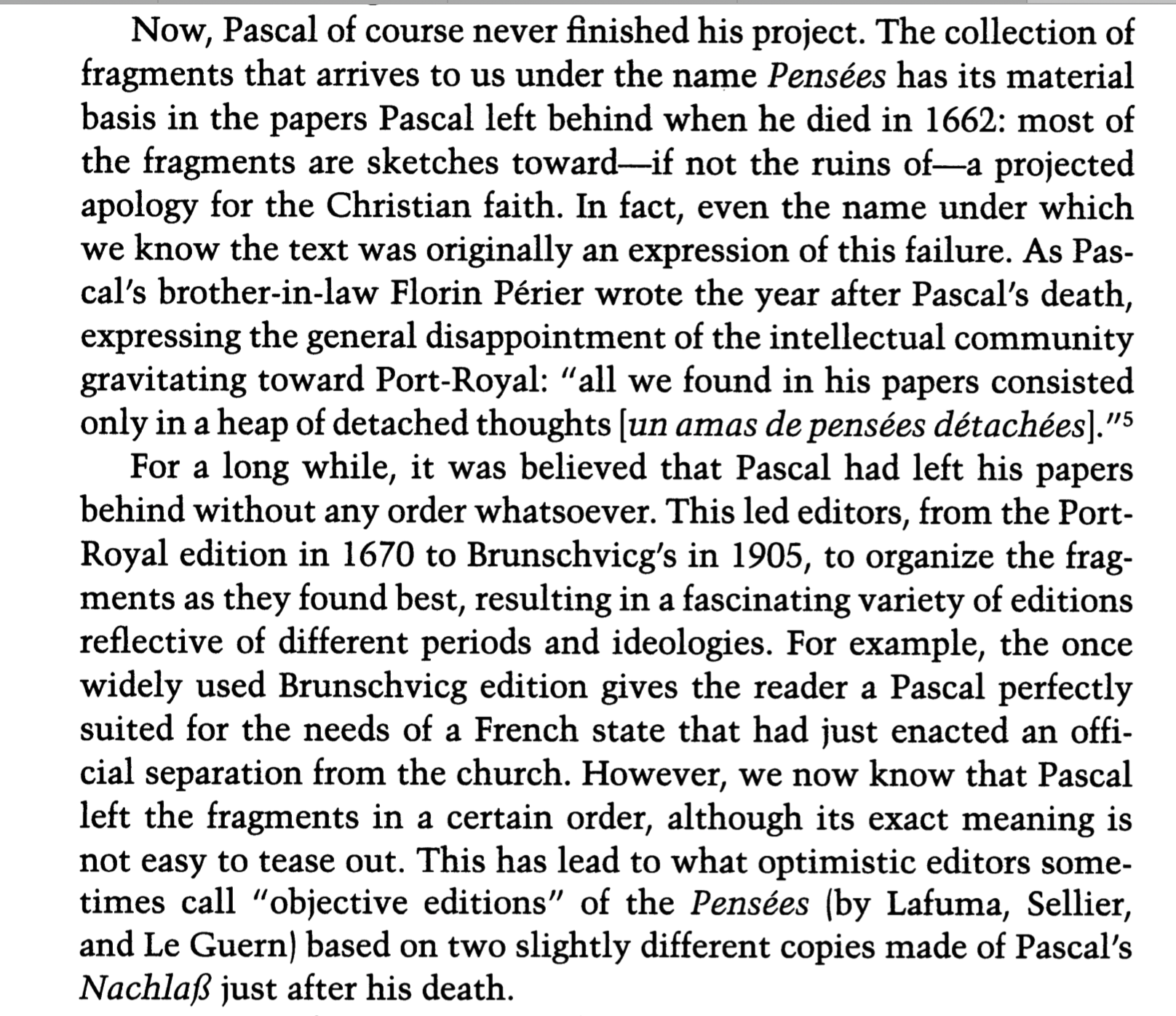
Links courtesy of Samantha McClellan
Beyond Good and Evil: https://resources.saylor.org/wwwresources/archived/site/wp-content/uploads/2011/09/PHIL101-5.3.3.pdf


Nothing below is required for this course:




Photos taken by Avital Ronell
Recommended Readings:
Plato, The Sophist and Gorgias
David Edmonds and John Eidinow, Rousseau's Dog: Two Great Thinkers at War in the Age of Enlightenment
Henri Guillemin, Jean-Jacques Rousseau. l'affaire Jean-Jacques Rousseau - David Hume, 1766 / Volume 2, Cette affaire infernale
Henry James' review of a book on Emerson: "Emerson made the esoteric audible."


Emerson, Literary Criticism: Essays on Literature, American Writers, English Writers, Emerson's journal entry Feb 8 1840 on the disappointment he felt at the end of one of his succesful lecture tours, Emerson Selected Journals 1820-42, p.732
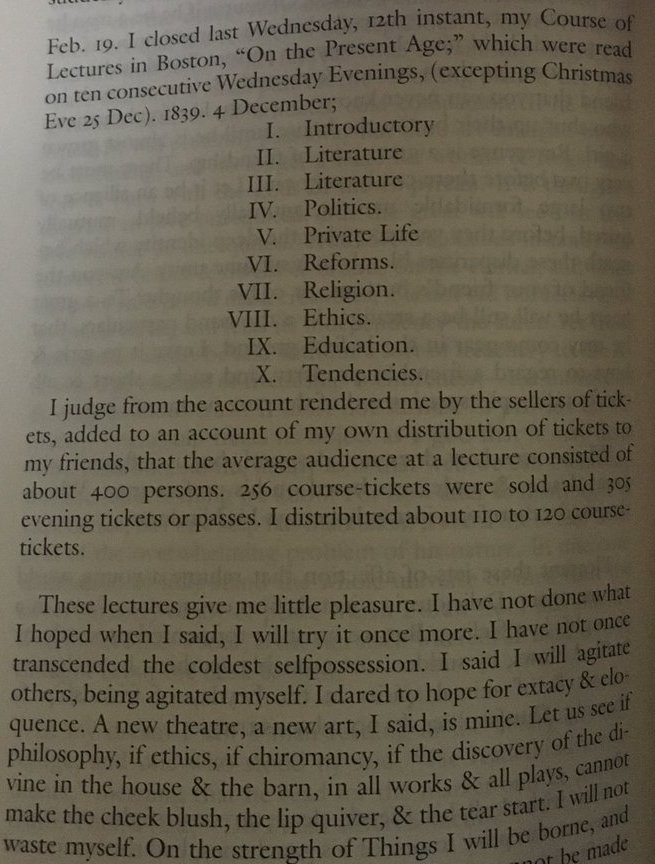

Barbara Packer, Emerson's Fall: A New Interpretation on the way Emerson's famous epigrams are hard to trace back to the essay in which they appear because they read like they could be found in any of his essays.
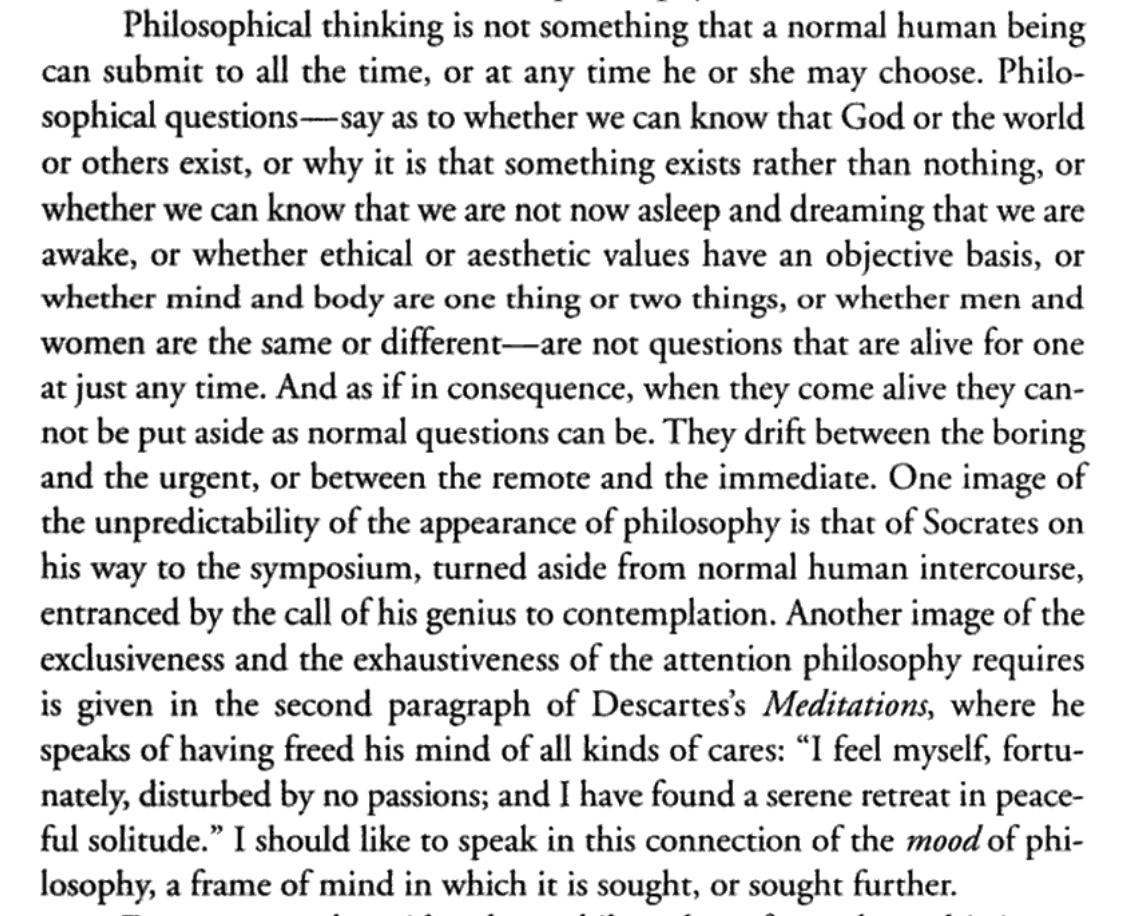
Stanley Cavell, Emerson's Transcendental Etudes, p. 24
So let your dances be entwined,
Yet not perplex men unto gaze:
But measured, and so numerous too,
As men may read each act they do;
And, when they see your graces meet,
Admire the wisdom of your feet:
For dancing is an exercise
Not only shows the mover’s wit,
But maketh the beholder wise,
As he hath power to rise to it.
Ben Jonson, "Masque of Pleasure and Virtue"
Recommended Reading:
"The Poet"Public Opinion and Literature Jacques Derrida, "CALL IT A DAY FOR DEMOCRACY''
Thomas De Quincey, The Last Days of Immanuel Kant
Les Derniers Jours D'Emmanuel Kant (The Last Days of Immanuel Kant w/ English subs)
Sigmund Feud, "My Contact with Josef Popper-Lynkeus" (1932)
Two Animations of Plato’s Allegory of the Cave: One Narrated by Orson Welles, Another Made with Clay
When Nietzsche Wept (dir. Pinchas Perry, 2007)
ACCIDENT OCCASIONNE PAR UN CHIEN "Un accident incontestable est longuement raconté dans la promenade de la « Seconde Rêverie »"
Recommended Reading:
Jean-Jacques Rousseau, "Second Reverie" of Reveries of the Solitary Walker (This essay recalls Montaigne's "Of Practice.")

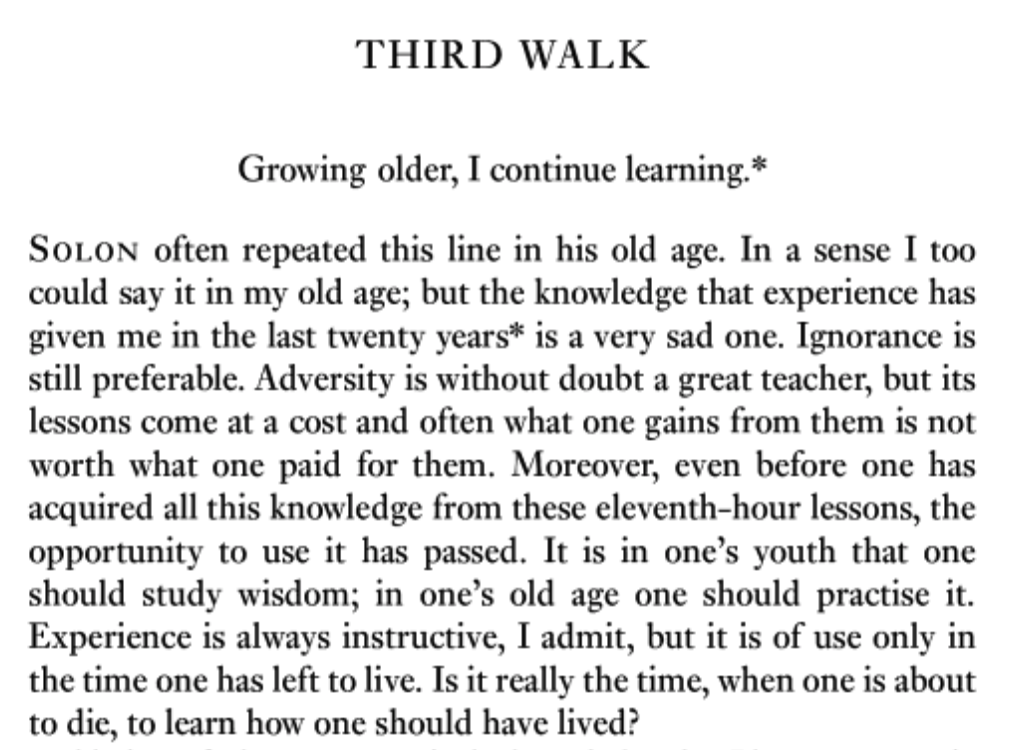
April 8 Stoicism--Philosophy is Learning How to Die
Required Readings:
Michel de Montaigne, "To His Father: On the Death of La Boétie," in Complete Works of Montaigne, Trans. Donald Frame, 1276-88.
April 12
Recommended Viewing:
A Tale of Winter (dir. Eric Rohmer, 1992)
Recommended Reading:
Stanley Cavell, "Shakespeare and Rohmer," in Cities of Words
Michel de Montaigne, "A Custom of the Isle of Cea"
Michel de Montaigne, "Of Coaches," Essays, Book Three, Chapter Six.
Jacques Derrida, Session Eleven, Death Penalty Seminar, Vol. 1, pp. 270-83.

RICHARD PARISH, "ETAT PRESENT BLAISE PASCAL," French Studies, Vol. LXXI, No. 4, 2017, 539–550.
Ocasio-Cortez Claims World Will End in 12 Years Due to Climate Change
Since Decriminalization, 96% of People Arrested for Weed in Baltimore Are Black
GEERT LOVINK, Sad by design 10 January 2019
EP. 114 GEERT LOVINK ON “SAD BY DESIGN,” DECEMBER 12, 2018
Kirk Wetters, "Chapter Three: The Opinion System and the Re-formation (Hobbes, Locke, Mendelssohn, Fichte, and Goethe)," in The Opinion System: Impasses of the Public Sphere from Hobbes to Habermas (2008), 123-78
Kamala Harris for more prisons!
"Strong" - Kamala Harris for Senate
Kamala Harris Announces Presidential Run With PLATITUDES
March 3: The Immorality of Moral Studies
Required Viewing and Reading:
At Berkeley (dir. Frederick Wiseman, 2013)
Friedrich Nietzsche, Anti-Education: On the Future of Our Educational Institutions

Michel de Montaigne, "That to Philosophize Is Learning How to Die," in Shakespeare's Montaigne, the Florio Translation of the Essays, Selections, Ed.Stephen Greenblatt, pp. 13-33.
2. 

"Peinture-écriture / Pittura-scrittura"
FOR YOUR FIRST AND SECOND PAPERS:
If you need any help, just email or talk to me in class and we can schedule a time to talk. Close reading and writing as you read are exploratory and experimental. That's what's cool about close reading. You can have a very good idea of what you want to pay attention to, but you can't really program what will be read or how it will be read exactly in advance. And when you do get "a read" on the book, you'll know it is provisional, that you'll only know the book as well as do a good friend (or, dare I say, a lover). There are tacit rules, but there is no referee, just a reader. The idea is to be less inhibited about your own writing when you read, as in, “you can say that? And say it that way? Really?!” Yes, you can. And more. Your assignment is to do a close reading of an assigned text. Focus on a passage or just a sentence and discuss it in detail in order to illuminate something more general about the text you're writing about. That passage is your paper topic. Cite the text to make your points. The text is your evidence. If you don't know what a close reading is and have never done one before, be sure to go to http://writingcenter.fas.harvard.edu/pages/how-do-close-reading. You may also ask me for clarification. You must also know how to write a research paper, or analytical essay. You will need a title for your paper and a thesis, an argument that you can state in one sentence. Your thesis should go at the end of your first paragraph. You may figure out your title before you write your paper, but usually, you only figure out your title after you figure out your thesis. And you figure out your thesis by writing your paper. What you think is your conclusion often needs to be moved up from the end of the essay to the front. Then you are ready to make your final revisions and add a new concluding paragraph. You may also have come up with a new title in the course of writing the paper. And then you are ready to proofread your paper. And then you will have finished writing your paper. Congratulations! :) Email your paper (as an attachment) to me at [email protected]. Put your name in the subject title or header of your title. Remember to put your name in your paper.
Auerbach’s expanded version emended version of first paragraph of Du Repentir:
Les autres forment l'homme: je le recite; et en represente un particulier bien mal forme, et lequel si j'avoy a faconner de nouveau, je ferois vrayment bien autre qu'il n'est. Meshuy, c'est fait.
--Montaigne,
Auerbach quotes from Montaigne's Essais. Ed. Villey (Paris, Akan, 1930)
To make this point clearer, let me supply some syntactic vinicula: (Tandis que) les autres forrnent l'homme, je le recite; (encore faut-il ajouter que) fe represente un particulier (; ce particulier, c'est moi-meine, qui suis, je le sais,) bien mal forme; (soyez surs que) si l’avais ale faqonner de nouveau, je le ferais vrayment bien autre qu'il n'est. (Mais, malheureusement) meshuy c'est fait.
--Auerbach’s emended version with vinicula added
Others form man; I describe him, and portray a particular, very ill-made one, who, if I had to fashion him anew, should indeed be very different from what he is. But now it is done.
--The Essays of Montaigne. Translated by E. J. Trechmann, Oxford University Press, 1927. The translation Auerbach uses.
(While) others form man; I describe him, (yet I must add that) I portray a particular (this particular, it’s myself, who am, I know it), very ill-made one (you can be sure of that), who, if I had to fashion him anew, should indeed be very different from what he is. (But, unfortunately) now it is done.
--My translation of Auerbach’s emended translation, with his vinicula supplied
Due Tuesday, January 29 by 5:00 p.m.: Two discussion questions on Heinrich von Kleist, "On the Gradual Construction of Thoughts During Speech" or Heinrich von Kleist, "On the Gradual Production of Thoughts Whilst Speaking" and three BIG WORDS, numbered one, two, and three. Put your name at the top left of the document. Email all work to me at [email protected]
January 30 Thinking on Your Feet
Recommended Reading (read one or both of these two translations:
Heinrich von Kleist, "On the Gradual Construction of Thoughts During Speech"
Heinrich von Kleist, "On the Gradual Production of Thoughts Whilst Speaking"
In class, I will spontaneously cold call on you to talk extemporaneously about a passage I will spontaneously chose.
Kleist: Selected Writings (Hackett Classics) 2004

Recommended:
Stephen Greenblatt, "Introduction: Shakespeare's Montaigne," pp ix-xxxiii.
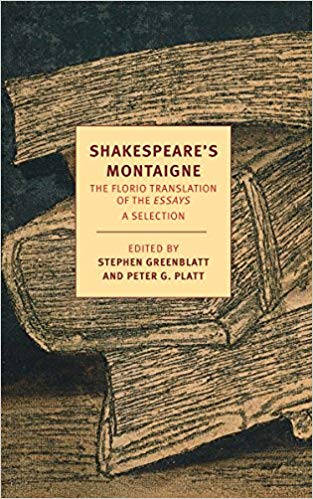
John Florio, Queen Anna's New World of Words
Thursday, January 31: No DQs due.
Friday, February 1
REQUIRED READING:
Arthur Schopenhauer, "Thinking for Oneself, " in PARERGA AND PARALIPOMENA, VOLUME 2 Chapter 22

Recommended Reading:
Stanley Cavell, "Introduction," in Cities of Words (2004).
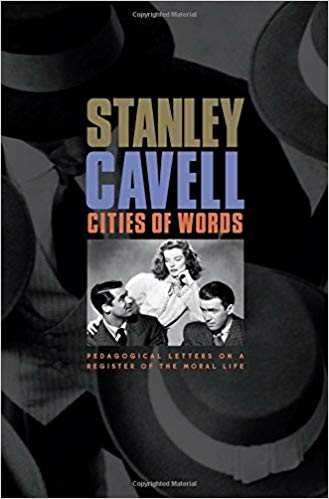
John Aubrey, Brief Lives

pp. vii; 1-9; 96-99; 102-05; 110-115; 173-77; 339-47; 382-88; 399-432.
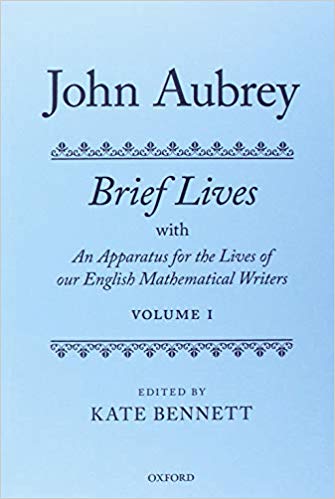
It Happened One Night (dir. Frank Capra, )
Stanley Cavell, Knowledge as Transgression: Mostly a Reading of "It Happened One Night" Daedalus Daedalus Vol. 109, No. 2, Intellect and Imagination: The Limits and Presuppositions of Intellectual Inquiry (Spring, 1980), pp. 147-175
The early crashes were actually depressions, like the Great Depression. They just aren't called that for obvious reasons.
From Big Bang to Big Crash: The Early Origins of the UK’s Finance-led Growth Model and the Persistence of Bad Policy Ideas Tami Oren O & Mark Blyth Published online: 21 May 2018
Tuckett, Elizabeth, Beaten tracks; or, Pen and pencil sketches in Italy. By the authoress of "A voyage en zigzag".
Immanuel Kant, Essay on the Maladies of the Head
Opinion, taste, and public opinion
BBC documentary Hypernormalization
Stoicism as one response to skepticism
For others, look to Cavell and Adorno on manfacturing Public Opionion
Literature / metaphor as the problem / solution to the impasses of public opinion
Aesthetic judgment before and after Kant
Two examples skepticism as misunderstood by the smug, vacuous, complacent, self-entitled, "we know better," pontificating, "serious," (new, neo-) liberal elites in academia:


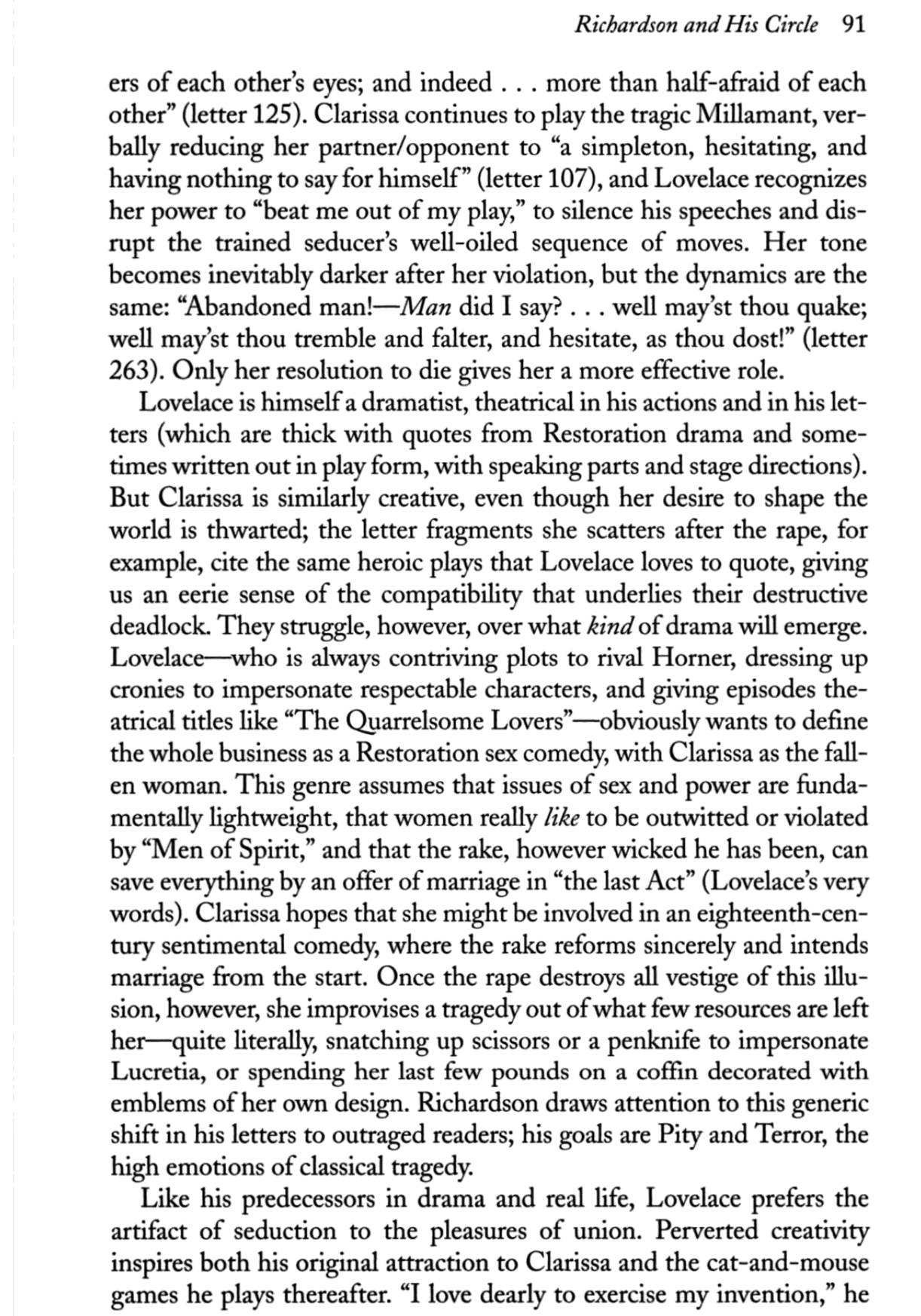
Miller, J. Hillis. “Presidential Address 1986: The Triumph of Theory, the Resistance to Reading, and the Question of the Material Base.” PMLA.
La médecine judiciaire dans les collections de la bibliothèque de la Cour de cassation
Montaigne_essais_traduction_livres1-23
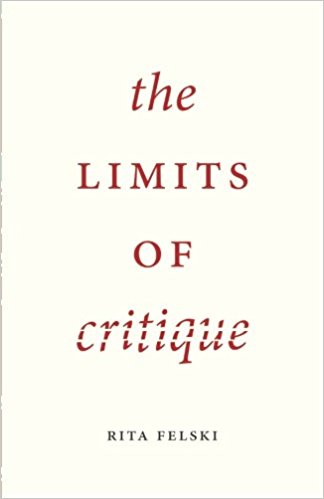
Cultivating Humanity: A Classical Defense of Reform in Liberal Education

Nietzsche: The Gay Science: With a Prelude in German Rhymes and an Appendix of Songs
Nothing Below Is Required:
. Two discussion questions on, numbered one and two, and Three Shots. Put your name at the top of the document. Email all work to me at [email protected]
At this point in the semester, I am now going to introduce a new game we will play irregularly. This is the game: I show you two passages, each taken from two books I've been reading recently, and will have you read them. The passages are both good, so I expect not everyone in the class will agree. Then you have to write down your answer. Then I will twll you the correct answer. Don't worry if you lose. I'll explain very carefully concisely why the students who agree with me and me are correct. :)
§257
Just as the largest library when not properly arranged does not provide as much use as a very moderate but well arranged one, so the greatest amount of knowledge, if not worked through by one's own thinking, has much less value than a far lesser quantity that has been thought through in various ways. For only through the universal combination of what we know, and comparing every truth with every other, do we completely assimilate our own knowledge and take control of it. One can only think through what one knows, which is why we should learn something; but one also knows only what has been thought through.
Now we can always apply ourselves arbitrarily to reading and learning, whereas to thinking we really cannot. For thinking must be kindled and sustained like a fire by a draught of air; there must be some interest in its subject, which may be purely objective or merely subjective. The latter is only present in our personal affairs, but the former is only for those minds who think by nature, for whom thinking is as natural as breathing, but who are very rare. Therefore in most scholars there is so little of it.
§258
The difference between the effect that thinking for oneself has on the mind, versus that of reading is incredibly large, which is why it constantly magnifies the original difference between minds, by virtue of which we are driven to one or the other. Reading, that is, forces thoughts on the mind that are as foreign and heterogeneous to its momentary direction and mood as is the seal to the wax on which it presses its imprint. The mind here experiences a total external compulsion to think this or that at random, for which it simply has no inclination or mood. – On the other hand, with thinking for oneself it follows its own peculiar drive, as this for the moment was more specifically determined by either the external environment or some recollection. For the intuitive environment does not force one specific thought on the mind, like reading; instead, it provides the mind with material and occasion to think what is in accordance with its nature and present mood.
Kierkegaard on chatter
Heidegger on "idle speech" and "They."
No Explaining
Arthur Schopenhauer, "On Noise," in Studies in Pessimism
Walter Benjamin on Montaigne on Herodotus
Due Tuesday, January 29 by 5:00 p.m. You Know the Drill:Two discussion questions on Michel de Montaigne, "Apology for Raymond Sebond" as well as three BIG WORDS, numbered one, two, and three. Put your name at the top left of the document. Email all work to me at [email protected] I will no longer post due dates since you now know when they are due.
Montaigne "Of Books"

Whereby may be seen that nothing is so hard or so uncertaine to be found out as the certaintie of the truth, sithence no man can put any assured confidence concerning the truth of a battel, neither in the knowledge of him that was Generall or commanded over it, nor in the soldiers that fought, of anything that hath hapned amongst them; except after the manner of a strict point of law, the severall witnesses are brought and examined face to face, and that all matters be nicely and thorowly sifted by the objects and trials of the successe of every accident. Verily the knowledge we have of our owne affaires is much more barren and feeble. But this hath sufficiently been handled by Bodin, and agreeing with my conception. Somewhat to aid the weaknesse of my memorie and to assist her great defects; for it hath often been my chance to light upon bookes which I supposed to be new and never to have read, which I had not understanding diligently read and run over many years before, and all bescribled with my notes; I have a while since accustomed my selfe to note at the end of my booke (I meane such as I purpose to read but once) the time I made an end to read it, and to set downe what censure or judgement I gave of it; that so it may at least at another time represent unto my mind the aire and generall idea I had conceived of the Author in reading him. I will here set downe the Copie of some of my annotations, and especially what I noted upon my Guicciardine about ten years since: (For what language soever my books speake unto me I speake unto them in mine owne.) He is a diligent Historiographer and from whom in my conceit a man may as exactly learne the truth of such affaires as passed in his time, as of any other writer whatsoever: and the rather because himselfe hath been an Actor of most part of them and in verie honourable place.
--Michel de Montaigne, "Of Bookes"
"UMass Says You Can't Say 'Fuck Nazis' Because It's Not Inclusive"
Netflix's Patriot Act: Neoliberal Establishment Authoritarian "News Comedy" on Social Media and Free Speech
Netflix Pulls Episode of Hasan Minhaj’s Show for Criticizing Saudi Arabia over Khashoggi Killing
Content Moderation And Free Speech | Patriot Act with Hasan Minhaj | Netflix
Tipper Gore / Tipper Gore Senate Hearing 1985
Communications Decency Act 1996 Written by a Democrat and signed into law by President Clinton.
"Supreme Court Throws Out Communications Decency Act," NY Times, June 26, 1997
Coming to Netflix: The Obamas Sign Deal to Produce Shows
Netflix Names Former Obama Adviser and U.N. Ambassador Susan Rice to Board



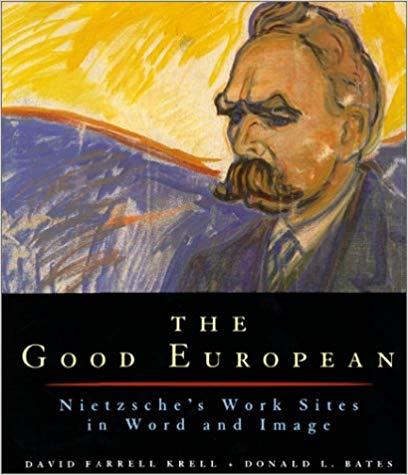
F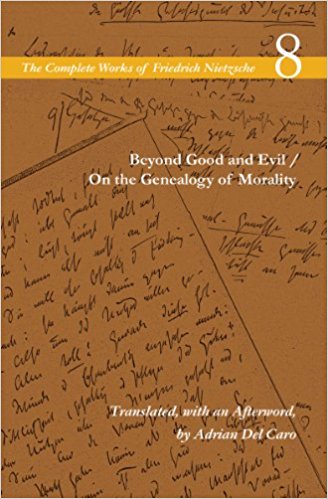
M
W
F
Rousseau, (Fourth and Sixth of the) Reveries of a Solitary Walker
M
W Michel de Montaigne, "That to Study Philosophy is to Learn to Die" (1580)
F
Schopenhauer http://users.clas.ufl.edu/burt/LoserLit/shelfhelp.html
M John Locke, An Essay on Human Understanding
Recommended Readings (Not Required):
Sarah Kofman and Duncan Large, "Explosion I: Of Nietzsche's Ecce Homo"
Diacritics, Vol. 24, No. 4, Special Section: On the Work of Avital Ronell (Winter, 1994), pp. 50-70
Sarah Kofman and Madeleine Dobie, "The Psychologist of the Eternal Feminine (Why I Write Such Good Books, 5)"
Yale French Studies, No. 87, Another Look, Another Woman: Retranslations of French Feminism (1995), pp. 173-189
W Kirk Wetters The Opinion System
F Lichetneberg The Waste Books
Kirk Wetters chapter
Kirk Wetters, Chapter Four "Lichtenberg's Opinion System (Meinungen-System)" in The Opinion System: Impasses of the Public Sphere from Hobbes to Habermas (2008)
G. C. Lichtenbergs ausführliche Erklärung der Hogarthischen Kupferstiche
Michel de Montaigne, "Of Coaches" Essays, Book Three, Chapter Six.
Jacques Derrida, Death Penalty Seminar, Vol. 1, Session Eleven, pp. 270-83.
Seneca, "On the Shortness of Life"
Maurice Blanchot, "The Last Word" in Friendship (1971; trans 1997)
Maurice Blanchot, "The Very Last Word" in Friendship (1971; trans 1997)
Maurice Blanchot, "Idle Speech," from Friendship.
Jacques Derrida, "Fichus" and selected letters written by Walter Benjamin that Derrida discusses in "Fichus."
Jacques Derrida, "Force of Law"
Walter Benjamin, "Critique of Violence"
Derrida, Call It a Day for Democracy
"blind refusal to read"; "obligation to read"
Miller, J. Hillis. “Presidential Address 1986: The Triumph of Theory, the Resistance to Reading, and the Question of the Material Base.” PMLA.
Frederick Wiseman's new film EX LIBRIS (2018)
La médecine judiciaire dans les collections de la bibliothèque de la Cour de cassation
Montaigne_essais_traduction_livres1-23

At Berkeley on Kanopy
Begin with Nietzsche's Anti-Education
Badiou The True Life
Stanley Cavell Cities of Words Introduction
Email all work to me at [email protected].

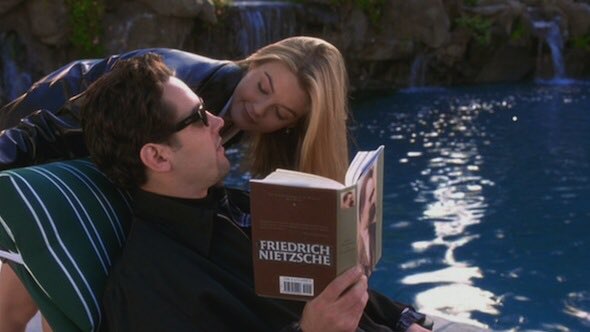

Topics:
Death
David Hume, An Eqnuiry

David Hume, My Own Life
Maurice Blanchot on Hume and Rousseau
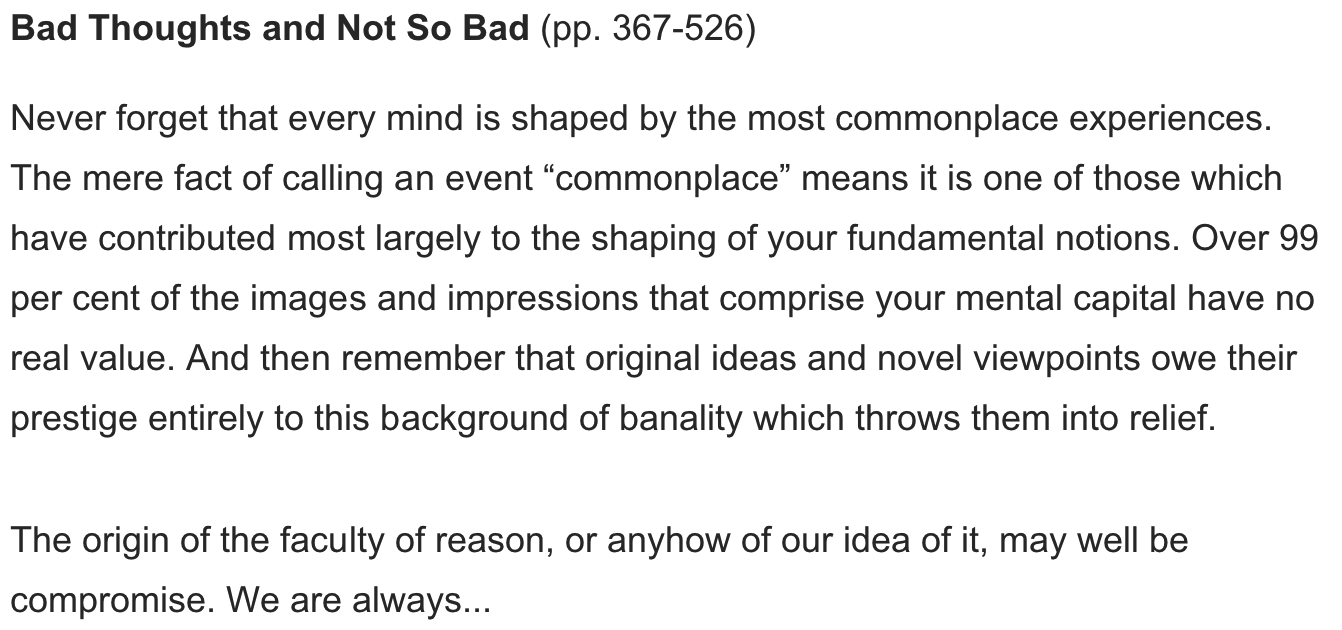
Paul Valery
Friendship
Maurice Blanchot, “Friendship”
Thinking for Yourself
"Critical Thinking?"
Books and the Art of Reading
Epictetus and Robin Hard
Discourses, Fragments, Handbook (Oxford Worlds Classics)

Diogenes the Cynic Robin Hard Diogenes the Cynic: Sayings and Anecdotes, With Other Popular Moralists 1st Edition

Marcus Aurelius
Meditations: with selected correspondence (Oxford World's Classics)
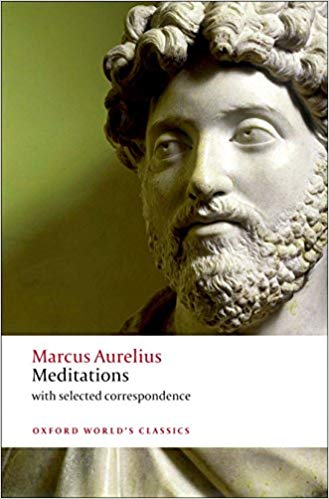
Nietzsche, Friedrich. 1872 anti-education Harper's Magazine
Walter Benjamin on Montaigne on Herodotus
Immanuel Kant, Essay on the Maladies of the Head
Typos Matter! Edgar Allan Poe, "X-ING A PARAGRAB" 1850
Arthur Schopenhauer, "Chapter 2: On Logic and Dialectic," in Parerga and Paralipomena: Volume 2: Short Philosophical Essays (The Cambridge Edition of the Works of Schopenhauer) The Cambridge Edition of the Works of Schopenhauer
Schopenhauer, Arthur, Janaway, Christopher, Del Caro, Adrian
Friedrich Nietzsche, "Schopenhauer as Educator"
https://drive.google.com/drive
Emerson “On Montaigne.” (Seneca)
Plato (the Socratic dialogue), Kant, Rousseau, Locke, Hobbes, Lichtenberg, Hume, and Schopenhauer. Literature as a challenge to Stoicism and the Enlightenment and as challenged by it. Selections from Kirk Wetters, Jurgen Habermas, Reiner Kosseleck, and Jacques Derrida.